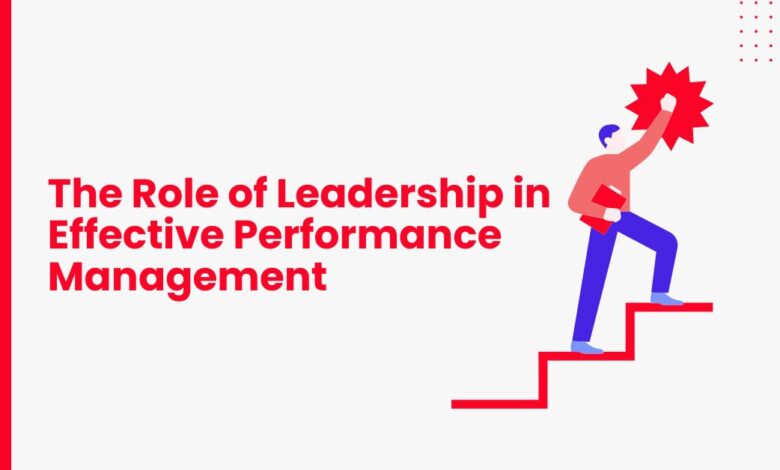The Role of Leadership in Effective Performance Management

In today’s competitive business landscape, effective performance management isn’t just a task for HR departments; it’s a critical leadership responsibility. Leadership plays a pivotal role in shaping organizational culture, setting expectations, and driving performance outcomes. This article explores the essential elements of leadership in ensuring successful performance management strategies, highlighting key practices, challenges, and the impact on organizational success.
Introduction
Performance management encompasses the processes and systems used to align individual and team goals with organizational objectives, monitor progress, and improve productivity. While it involves various stakeholders, including HR professionals and employees themselves, leadership’s influence is particularly crucial. Leaders define the vision, values, and expectations that guide performance management initiatives, making their role integral to fostering a high-performance culture.
Setting Clear Expectations
At the core of an effective performance management system is clarity in expectations. Leaders must articulate clear and measurable goals that align with the organization’s strategic priorities. These goals serve as benchmarks against which employee performance is evaluated and rewarded. By setting expectations early and communicating them consistently, leaders create a framework that empowers employees to focus their efforts and contributions effectively.
Creating a Culture of Accountability
Leadership establishes the tone for accountability within an organization. Accountability goes beyond mere adherence to rules; it encompasses taking ownership of outcomes and responsibilities. Effective leaders foster accountability by holding themselves and others answerable for results. They promote a culture where feedback is constructive and performance discussions are regular and supportive. This approach not only motivates employees to strive for excellence but also reinforces the organization’s commitment to continuous improvement.
Providing Support and Resources
Supportive leadership is essential for optimizing employee performance. Leaders should ensure that employees have access to the resources, training, and development opportunities needed to succeed in their roles. This may include providing coaching, mentoring, and professional development programs that enhance skills and competencies aligned with organizational goals. By investing in their team’s growth, leaders demonstrate their commitment to individual and collective success, which in turn boosts morale and engagement.
Empowering Through Communication
Effective communication is a cornerstone of a successful performance management system in India. Leaders should maintain open channels of communication to keep employees informed about organizational changes, expectations, and performance outcomes. Transparent communication builds trust and fosters a collaborative environment where employees feel valued and empowered. Leaders who actively seek and act upon employee feedback demonstrate a commitment to continuous improvement and employee well-being.
Aligning Recognition and Rewards
Recognition and rewards play a significant role in motivating employees and reinforcing desired behaviors. Leaders must ensure that recognition programs are aligned with performance management objectives and organizational values. This involves acknowledging individual and team achievements in a timely and meaningful manner. By linking rewards to performance outcomes, leaders create incentives that inspire higher levels of engagement and commitment among employees.
Overcoming Challenges in Performance Management
Leadership in performance management isn’t without its challenges. One common obstacle is overcoming bias in performance evaluations. Leaders must strive for fairness and objectivity when assessing performance, focusing on measurable results and behaviors rather than subjective impressions. Additionally, managing underperformance requires sensitivity and a proactive approach to identify root causes and provide necessary support or corrective action.
Embracing Continuous Improvement
Leadership in performance management is also about embracing a mindset of continuous improvement. Effective leaders regularly evaluate the effectiveness of performance management processes and make adjustments as needed. They stay informed about industry best practices and emerging trends to ensure their approach remains relevant and impactful. By fostering a culture of learning and adaptation, leaders empower their teams to innovate and evolve in response to changing market dynamics.
The Impact on Organizational Success
Ultimately, leadership’s role in effective performance management directly impacts organizational success. When leaders prioritize performance excellence, they cultivate a workforce that is motivated, engaged, and aligned with strategic goals. This alignment drives operational efficiency, enhances customer satisfaction, and positions the organization for sustained growth and competitive advantage in the marketplace.
Conclusion
In conclusion, leadership in effective performance management is instrumental in shaping organizational culture, driving accountability, and optimizing employee performance. By setting clear expectations, providing support and resources, fostering open communication, and aligning recognition with performance outcomes, leaders create an environment where individuals and teams thrive. Embracing continuous improvement and overcoming challenges with fairness and objectivity further strengthens leadership’s impact on organizational success. As businesses navigate evolving demands and opportunities, effective performance management remains a cornerstone of sustainable growth and achievement. Top HR companies in India offer robust solutions that integrate seamlessly with performance management strategies, enhancing organizational effectiveness and employee engagement.



